Menu
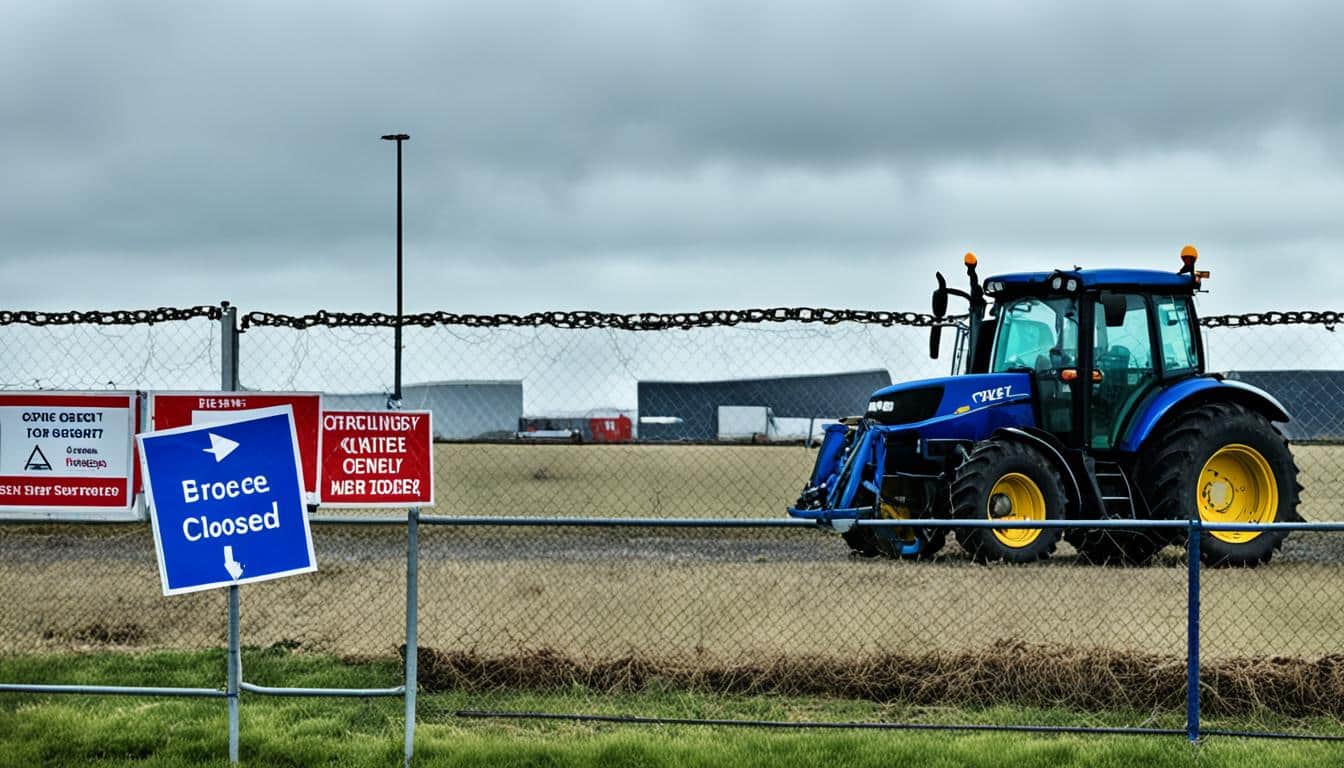
Since Brexit, there’s been more red tape in trading between the UK and the EU. This means moving goods has gotten a lot harder for farmers. It has seriously disrupted their supply chain, causing many problems.
Getting the right approvals takes longer now. This is leading to more food being wasted, hurting farmers’ incomes. What’s more, there aren’t as many immigrant workers in the farming sector. This lack of workers is making it even harder to keep up with farming.
These delays are making everything more expensive and time-consuming. The costs for quality checks and inspections are piling up. All this could mean UK-grown food becoming more expensive. Plus, farmers have lost about €4 billion a year from the EU, under the CAP. This has made their future much less certain.
Not everything has been bad, though. Grain exports are still doing well because they last longer. But, the sheep meat industry has faced some tough times. It’s struggling to send meat to the EU. To make things better, both the government and farmers need to think about getting more people to work in farming. This would help the UK rely more on itself, after Brexit.
Brexit is changing the way the UK does business, especially in agriculture. The UK was part of the EU for over 40 years until deciding to leave. This change means the UK must find new ways to do agriculture without EU help.
The change affects how the UK trades food both at home and abroad. In 2020, the UK’s farms and food made a total of $34.2 billion. But the UK bought more food than it sold, spending $75.5 billion on imports and only selling $30.5 billion abroad.
Brexit and food supply are very linked, especially with the EU. Before Brexit, lots of UK food went to the EU – about 43% of what was sold. For example, U.S. farming goods worth $2.7 billion were sold in the UK, and the UK sold $1.1 billion of goods to the U.S.
| Year | Imports (Billion USD) | Exports (Billion USD) | Net Importer |
|---|---|---|---|
| 2020 | $75.5 | $30.5 | Yes |
Leaving the EU also means UK farmers are missing out on €4 billion a year in support. Studies suggest our food might cost more in the future, meaning change is needed.
There are new challenges – more paperwork and checks slowing down trade. But some areas, like exporting grain, seem to be managing. However, selling sheep meat might be harder.
The UK needs to rethink its farming plans because of Brexit. It’s not just about trading; it’s about keeping UK farms strong and successful.
Post-Brexit, the U.K.’s agricultural sector is facing new challenges. There are more trade barriers and bureaucratic red tape to deal with. Import-export rules have changed a lot, making it harder for suppliers to send goods to the EU. This has led to delays and challenges in keeping products fresh.
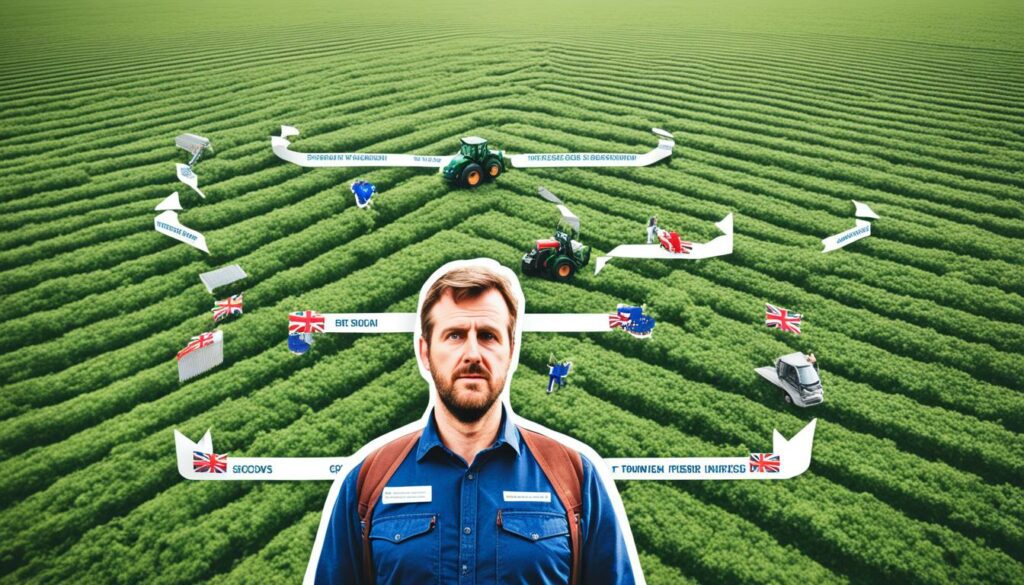
Getting the right documents and approvals is tough now for agricultural suppliers. This often delays their transactions. The process also involves detailed checks and even specific approvals for different EU countries. Businesses could spend £400 million more on new border checks starting from October. These checks will slow down how quickly goods move, harming farming and livestock businesses the most.
Since Brexit, quality controls and inspections have also gone up. This means more expenses for businesses and higher prices for their goods. A batch of goods could cost an extra £23 to £43 for checks at ports. These extra costs hurt both suppliers and buyers, making life tough for the U.K.’s farming sector.
After Brexit, agricultural suppliers are facing tough times. The challenges are making the farming supply chain less efficient and more expensive. It’s crucial to find a way through all this extra red tape. This is key to keeping the agriculture sector strong during this big change.
Post-Brexit, the UK faces more red tape, including extra paperwork and slow approvals. This has caused large amounts of food to go to waste. The whole day’s worth of stock can be lost due to these new rules. The agriculture industry now deals with a lot more paperwork and strict checks when sending goods to the EU. This has made running things smoothly much harder.
These issues touch the lives of farmers and businesses deeply, causing them to lose a lot of money. The delay in getting approvals means less money for those in the farming industry. It also makes an already complicated supply chain even more inefficient. But, by tackling these approval delays, the agriculture sector can cut down on waste and use its resources better.
The money lost because of food wastage and slow approvals is a big worry. UK farmers used to get around €4 billion from the EU to help things run smoothly. But, without this, they face extra costs and more expensive transactions. So, selling their goods in the EU might become harder for them.
Here’s why this is happening:
| Issue | Impact |
|---|---|
| Increased Red Tape | Additional documentation and assessments for goods transfer |
| Approval Delays | Food wastage, loss of daily stock |
| Reduced Workforce | Impact on the industry’s workforce composition |
| Higher Costs | Increased supply chain costs affecting competitiveness |
| Loss of CAP Funding | Uncertainty about future financial support |
Facing these new rules and more paperwork, running operations has become more expensive. It’s now very important to cut down on costs and look at ways to improve the trade system. By working on these areas, the agriculture sector in the UK might be able to lessen some of the bad effects from Brexit and the challenges with food supply.
The UK’s farming logistics have changed a lot after Brexit. British farmers, who look after most farmland, find themselves in a new system. This system brings customs issues, more rules to follow, and new paperwork to deal with.
Brexit is forcing everyone in the farming supply chain to think differently. They’re coming up with new plans to keep food supplies certain, even with added challenges.
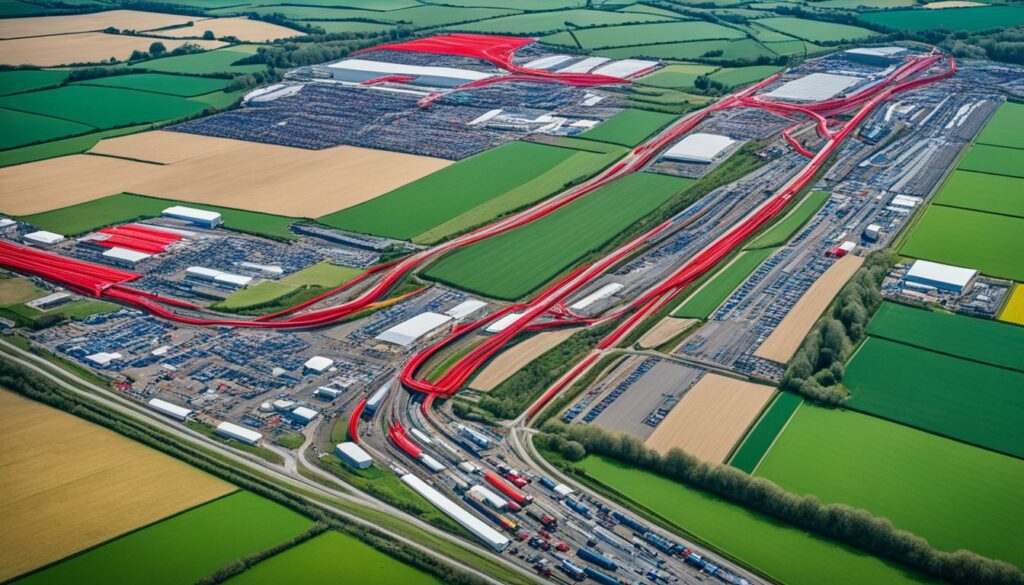
British farming is now aiming for sustainable profit. Initiatives like the “Great” campaign and Red Tractor Assurance help. They boost global exports and the UK’s reputation.
The food supply chain needs government help to do well after Brexit. It’s been tough, with Brexit, the Ukraine war, COVID-19, and rising prices causing problems. But, British farmers remain strong and flexible, ensuring food stays close, safe, and reliable.
| Key Aspects | Details |
|---|---|
| UK Farmland Management | 70% of the country’s farmland |
| Job Provision | 3.8 million jobs in the food supply chain |
| Annual Audit Costs | £2000-£5000 on average per audit |
| EU Payments (2014-2020) | 21 billion EUR in direct payments; 5.2 billion EUR for rural development |
| Main Agricultural Imports (2018) | 67 billion USD and nearly 44 million tonnes |
| Main Agricultural Exports (2018) | 32 billion USD and 14 million tonnes |
The change in UK farming now needs a team effort. Retailers and farmers need to work more closely together. As some farms close, new ideas and strong government help can keep the industry ahead.
After the Brexit transition, the UK’s agricultural sector faced a big hit in workforce availability. Immigrant workers, key to the industry, dropped significantly due to tighter immigration rules. This change caused major problems, reducing production and efficiency on farms.
The UK’s farming sector used to depend a lot on workers from EU countries. They were a big part of the workforce, thanks to the EU’s labour movement policy. But, after the EU-UK Trade and Cooperation Agreement, immigration limits increased sharply. This led to a shortage of workers, making agricultural trade after Brexit quite challenging.
The UK government is trying to help farmers deal with the workforce issue. They are encouraging more local people to join the farming sector. They are also using AI to help with finding and managing workers. Even with these steps, farming is still facing many problems.
A survey found that most businesses trading with the EU didn’t think the TCA helped them grow. This shows the broader challenges in the industry.
Government policies aim to ease the pressure. But the impact of Brexit on the farming industry is still huge. It requires more planning and support for the sector to survive in the long run.
The farming supply chain Brexit has brought many challenges. The biggest problem is the need for more paperwork. Export processes for shipments to the EU take much longer now, up to 5 days. This adds to the money and time UK firms must spend.
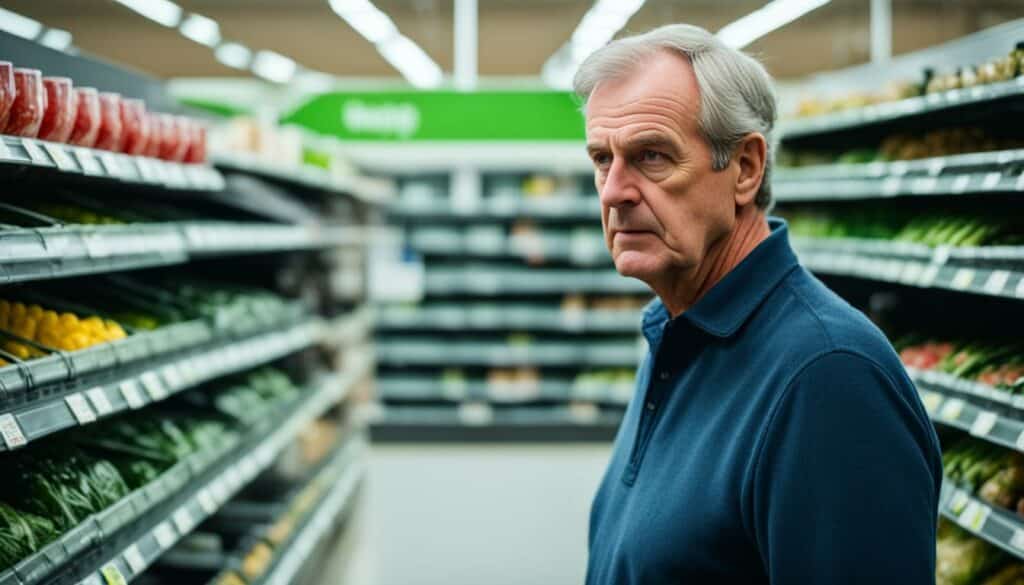
The number of lorries going from Dover to Calais has fallen dramatically. This drop – from 10,000 to about 2,000 daily – makes moving goods harder and more expensive. The British Retail Consortium warns of food shortages in Northern Ireland if issues with Export Health Certificates aren’t fixed quickly.
About 50,000 EU-focussed small UK businesses face higher costs since Brexit. While the zero tariffs, zero quotas deal should have helped, it’s not improved the situation much. The UK government is working with supermarkets to make moving goods smoother in Northern Ireland.
The UK needs over 26 billion EUR it once got from the EU for farming and rural development. Without this aid, and since the UK imports much of its food, prices for imported agricultural products will go up. Losing access to direct EU payments for farmers also creates financial worries.
| Statistic | Pre-Brexit | Post-Brexit |
|---|---|---|
| Time for Export Paperwork | 3 Hours | 5 Days |
| Lorries Crossing Dover-Calais | 10,000 Daily | 2,000 Daily |
| Funding for Farming and Rural Development | EU Support (26 Billion EUR) | UK Self-Funding |
| Direct EU Agricultural Payments | 21 Billion EUR | None |
The Brexit challenges for agricultural suppliers are clear. There’s a big need for clever solutions to cut costs and keep markets strong. The growing costs of the whole supply chain put UK goods at a disadvantage in EU markets. This has pushed everyone involved to find new ways to work and thrive.
The Brexit impact on farming shows in many ways, mainly through financial uncertainties. This is due to the end of the Common Agricultural Policy (CAP) funding by the EU. UK farmers relied on these subsidies, up to £3 billion a year, making up a big part of their income. Now, without this support, farmers are worried about their future.
After Brexit, the loss of CAP benefits created a big financial gap for UK farmers. Issues like more paperwork and delays led to food being wasted and less money coming in. There’s also a concern that the sheep meat industry will face big losses due to new trade barriers. It’s clear that farmers need new financial help to make up for what they’ve lost.
The UK government, through GOV.UK, is working on new ways to support farmers after Brexit. For example, Defra is pushing for more farmers to join environmental land management schemes to help nearly three-fourths of them by 2028. This effort aims to reduce financial pressure and encourage eco-friendly farming.
The ability of farmers to adapt, together with government help, is key to overcoming these challenges. This way, UK agriculture can find stability after such big changes.
Brexit has brought challenges to many farming areas. Yet, grain exports have shown their strength. Grains like wheat or barley last long, making them fit for longer trade times set by Brexit’s new rules.
In the past, the UK shipped over 14 million tons of wheat yearly. About 15% to 20% was sent to EU nations. This made European sales vital, making up 80% of all wheat exports between 2011 and 2016.
After Brexit, this strong trend continued. In 2016, over 2.1 million tons of wheat were still sold to the EU. This was out of the three million tons the UK managed.
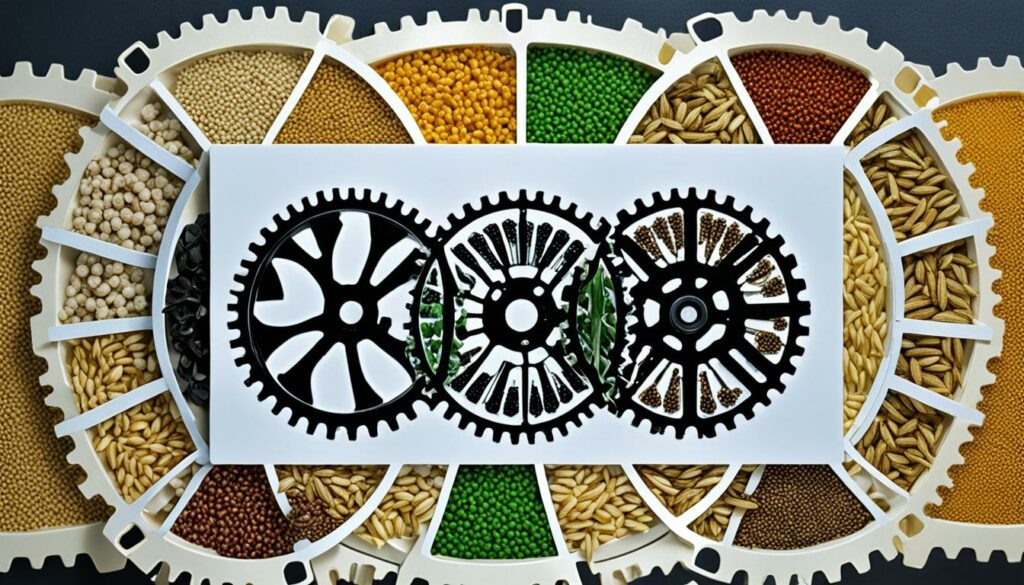
Grains are tough which has helped them fight through Brexit’s red tape. Even with threats of high tariffs, they keep the food supply flowing. This shows their crucial role post-Brexit.
So, while some farm areas struggle with high costs and not enough workers, grains are doing well. Their success shows how adaptable UK farm shipping can be. It also points to the value of good planning after Brexit.
The UK’s farming sector is changing due to Brexit. Many experts think there will be big changes. For example, the sheep meat industry sends 90-95% of its goods to the EU. After Brexit, exporting to the EU has gotten harder, meaning they might lose money.
There’s a shortage of workers because fewer immigrants are coming after Brexit. To add to this, UK farmers no longer get €4 billion a year in CAP subsidies. This means farming will cost more, and the local food prices might go up too.
But, there are some good things happening too. Since COVID-19, people want more locally grown beef. This demand could help farmers earn more money. To support the farming sector, the UK government and farmers may offer perks to get more people involved.
Despite the challenges, the goal is to keep farming sustainably and at high levels. This way, the UK’s farming can stay strong and ready for any changes after Brexit.
Local produce prices in the UK are going up after Brexit. This is because of several reasons. These include not enough workers, higher operational costs, and the end of certain farming subsidies. The way food gets from farms to our tables is facing big challenges. It needs new ideas and changes to keep prices steady.
The UK is short on workers, a problem made worse by rules after Brexit. Before, the farming sector heavily relied on workers from other countries. Now, it’s hard to keep up. And on top of that, bringing in some food items might cost more. This is tough for local farmers. They also have to deal with the increased costs.
People are now looking for beef that comes from nearby places more. The pandemic changed what and how we eat. Now, many prefer getting their beef locally. This is because importing it is not as easy as before. With Brexit, getting food from other countries can be tricky. Because of that, people in the UK are choosing more local foods. About three-quarters of them are supporting local farmers. They want to make sure they have enough food in the future.
The situation for UK farming is currently a mix of good and bad. It’s more costly to run and the rules are tighter. But, people wanting more local beef is a positive thing. It shows the need for plans that will keep this going.
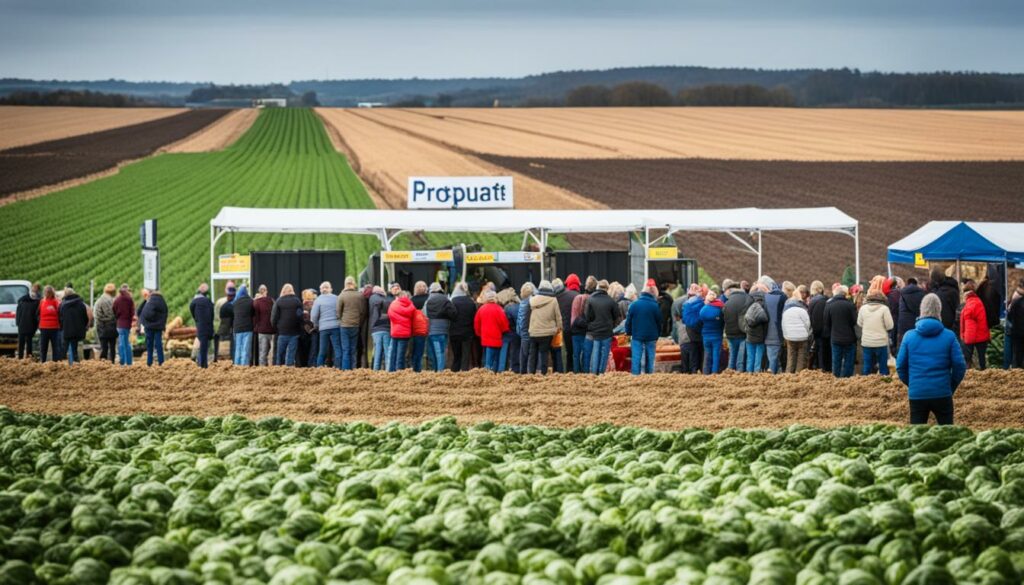
Brexit has changed how the UK does business, especially in agriculture distribution network Brexit. Now outside the EU, the UK is working on strong trade links with countries outside Europe. One important bond is with the United States, a key partner in UK agricultural logistics.
This shift in trade brings both chances and hurdles. In 2020, the UK bought $75.5 billion in farm products but sold just $30.5 billion. It shows UK mostly buys, not sells. U.S. exports to the UK were $2.7 billion. Against that, the UK sent $1.1 billion in goods to the U.S., mainly spirits.
NON-EU agricultural trade post-Brexit offers room for broadening. The U.S. sells more forest products to the UK, like wood, seeing a 17.74% yearly increase since 2010. In 2020, these sales reached $925 million. This growth showcases the U.S.’s strong role as a supplier.
U.S. tree nut sales to the UK have also tripled over the last ten years. The demand for almonds, walnuts, pistachios, and pecans has grown significantly. In return, the UK buys more wood products for energy, mostly pellets. The U.S. provided 64% of these imports in 2022.
With change comes the need to improve how we trade in agriculture. The UK and U.S. are talking about boosting trade in different farm products. This work could make trade stronger and reduce how much we depend on the EU.
After Brexit, rules for moving goods between the UK and the EU, including agriculture, have changed a lot. This change also affects deals with countries worldwide. To keep things running smoothly, everyone involved must learn and adapt quickly.
Agricultural suppliers face bigger challenges at the border after Brexit. More checks cause delays and might affect food’s freshness. Finding ways to make clearing goods quicker is key to avoiding problems. For example, almost 40% of trucks had delays crossing certain borders.
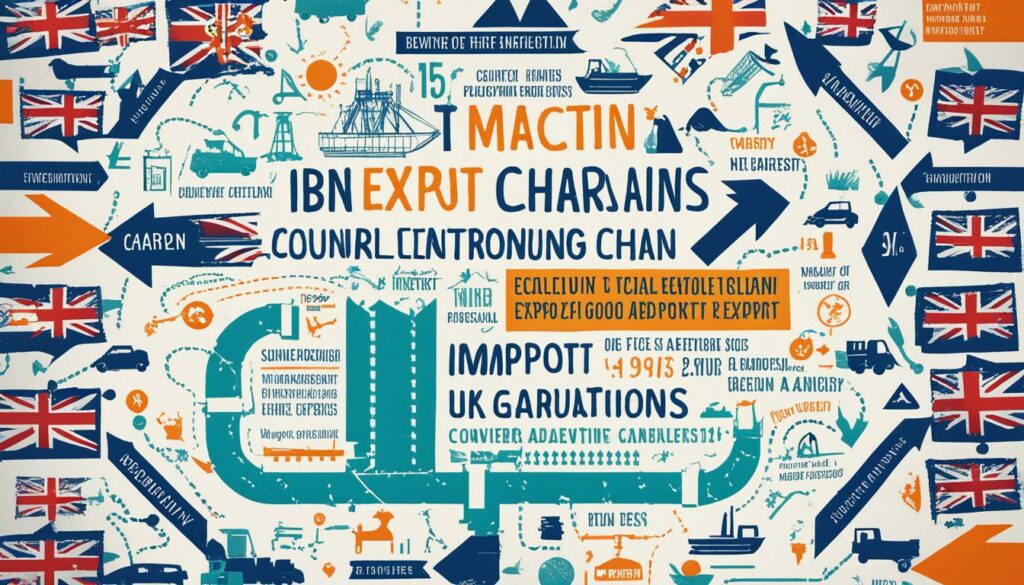
New trade deals shape the UK’s trading future. These deals come with rules that can be tricky and costly to meet. The aim is to keep the goods moving without extra barriers. Still, meeting these new rules has made food cost more since Brexit.
The changes are big for farmers and those who sell their produce. It’s not just about the EU – it’s about trading with the whole world better. Making border checks more efficient is part of keeping agriculture trading well.
The UK’s agricultural sector faces many hurdles due to Brexit. These include new trade barriers. These barriers change how agricultural logistics work in the UK.
Suppliers now face more tariffs and non-tariff barriers. This is especially tough for products like fresh fruits and vegetables. They need to move quickly to keep fresh.
A lot has changed in how costs are handled by UK and EU suppliers. Regulations have increased. This means more paperwork at the border. Everyone, from the companies to the end buyers, are feeling the pinch. These changes are causing big economic shifts.
As a measure against a no-deal Brexit’s impacts, companies are storing more goods. Stockpiling aims to lessen the effect of any sudden disruptions. It shows how weak the food and drink sector is to sudden changes. This calls for quick and clear support from the UK and EU. The goal is to protect the industry in the long run with better and more flexible plans.
The table below outlines important challenges posed by Brexit on agricultural suppliers:
| Challenges | Immediate Impacts | Long-term Consequences |
|---|---|---|
| Increased Tariffs | Higher Costs for Imports/Exports | Reduced Competitiveness |
| Regulatory Burdens | Extended Border Delays | Disruption in Supply Chain Continuity |
| Compliance Costs | Administrative Overheads | Financial Strain on Businesses |
| Stockpiling | Increased Inventory Holding | Potential Stockouts |
The Brexit challenges go beyond just not getting goods from point A to B smoothly. They are forcing the industry to change the way they operate. Everyone in the supply chain must rethink how they manage it. The key now is to be flexible and ready. This ensures the survival of UK agricultural logistics.
After Brexit, there are big changes afoot in the UK. Policies, valued at $34.2 billion (£26.7 billion) in 2020, play a big part. The EU once gave the UK’s sector $46.5 billion (€37.8 billion) in benefits. Now, the UK must make its policies work without this help.
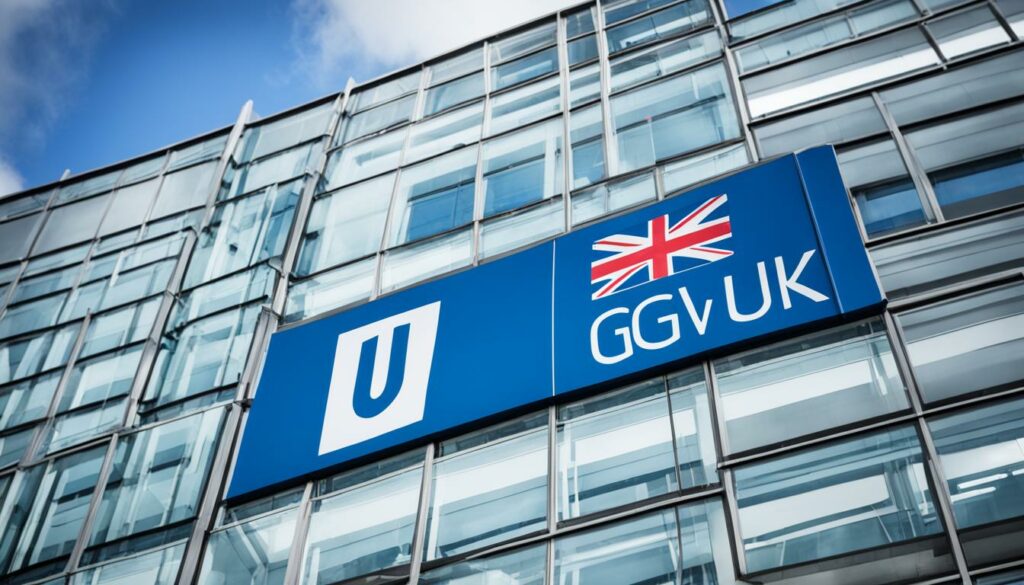
With Brexit, the UK looks to make things work in new ways. There’s a gap between what we bring in and what we sell – $75.5 billion to $30.5 billion in 2020. The new policies focus on:
Government moves are key in keeping the UK food flow steady post-Brexit. These new policies will really change how well our farming sector copes and grows.
| U.K. (2020) | U.S. (2020) | |
|---|---|---|
| Agricultural Exports | $30.5 billion | $2.7 billion |
| Agricultural Imports | $75.5 billion | $1.1 billion |
| EU Agricultural Imports (minus U.K.) | N/A | $30.6 billion |
| EU Agricultural Exports (minus U.K.) | N/A | $12 billion |
By looking closely at these numbers, we see how important the government’s actions are. GOV.UK’s new rules are vital for the UK’s farming future.
The agriculture distribution network in the UK has changed a lot since Brexit. It’s affected by new trade rules, a different workforce, and new financial setups. Brexit predictions agriculture show a mix of good and bad – like the strong grain exports but also higher costs and more rules. These shifts have hurt the UK economy a bit, with most people thinking Brexit was a negative move. Still, the UK now trades with the EU more, despite a lower share of two-way trade between them.
To help farmers and others, the government has stepped in. It’s creating new policies and help to lessen Brexit’s tough impacts. Even though the EU remains key for UK trade, dealing with more countries outside the EU is now on the table. This change aims to diversify trade and lower the UK’s reliance on a single market.
The future success of UK agriculture lies in how well it adapts with the help of government actions. There are hurdles, like more costs and red tape, but also chances for new ideas and being strong. Working together with a clear plan is key to keeping the farming supply chain in the UK strong and lasting.
Brexit has changed how the UK’s farming supply chain works. Now, there is more paperwork and approvals needed. This makes trading harder than before, especially without the EU’s ease.
Since leaving the CAP, there’s also less certainty about funds. Tighter rules on immigration mean fewer workers are available, which is another challenge.
After Brexit, the way farming products move around has become more complicated. There are stringent checks to follow and more documents to manage. This has increased costs and delays, affecting how fresh and competitive products are.
Trading with the EU now needs more detailed paperwork and strict checks. There are more steps to follow, including country-specific checks. This has caused delays and increased the costs of trading.
Long waits for paperwork and approvals have led to a lot of food being thrown away. This has also hit the earnings of farmers and businesses. It underlines the need for smoother trading with the EU.
Many hurdles have come up for the farming supply chain because of Brexit. These challenges include higher costs, more complex logistics, and less workers. Without CAP, there’s also money worries. All these issues disrupt the chain’s key processes.
With fewer workers due to stricter immigration, the agriculture sector has felt the strain. There are not enough people to work. This has slowed production and raised worries about meeting previous levels.
Govt help might be needed to fill the gaps and make processes smoother.
Without the usual €4 billion help from CAP, farmers are unsure about money. They need alternative support from the Govt to stay stable. It’s crucial for farming’s future after Brexit.
Grains are doing better post-Brexit because they last longer. They can handle being in trade for a long time. This is unlike things that go off quickly.
Local produce will likely cost more after Brexit. This is because there are less workers, more costs, and no CAP help. The changes from Brexit and worker shortages have made things tougher.
After Brexit, the UK can trade more with non-EU countries. This might reduce the UK’s reliance on EU goods. Better trade with places like the US could mean new opportunities for agriculture.
Post-Brexit, there are stricter checks at customs. New trade deals bring rules and costs that affect prices. Non-tariff barriers add to the challenges for everyone.
The Govt has to step in to help agriculture after Brexit. They need to replace the lost CAP money. Plus, they should encourage workers and set strong rules. This is to help the sector keep growing.